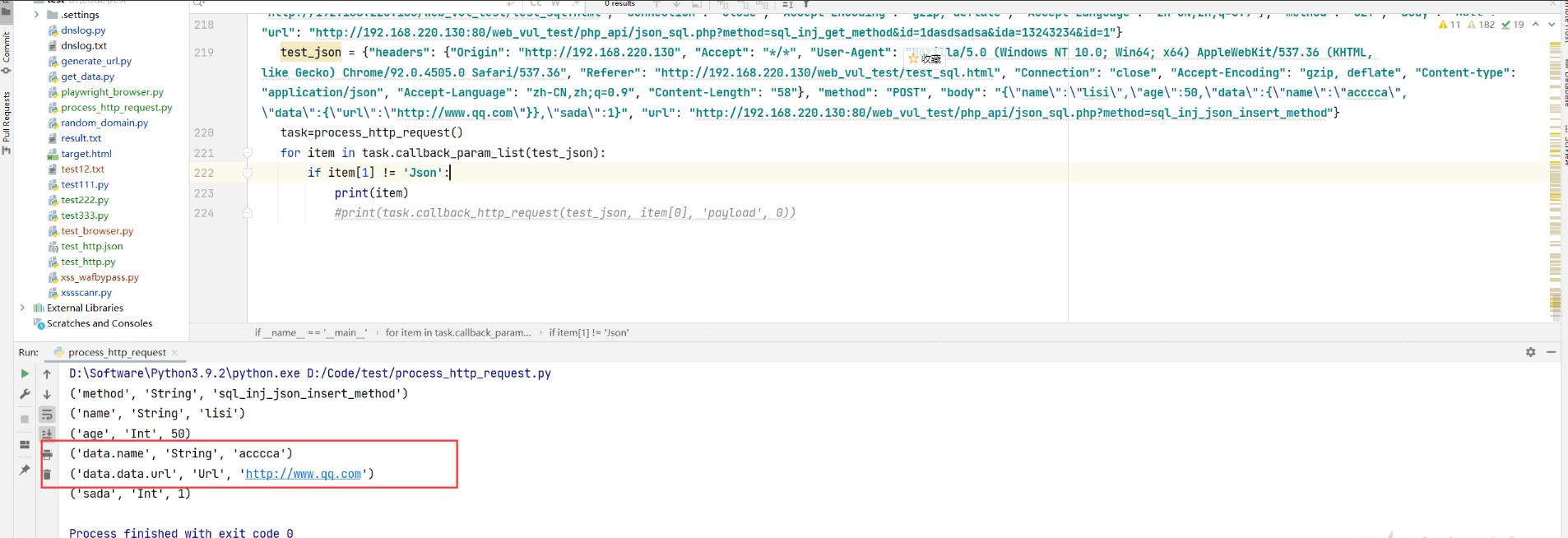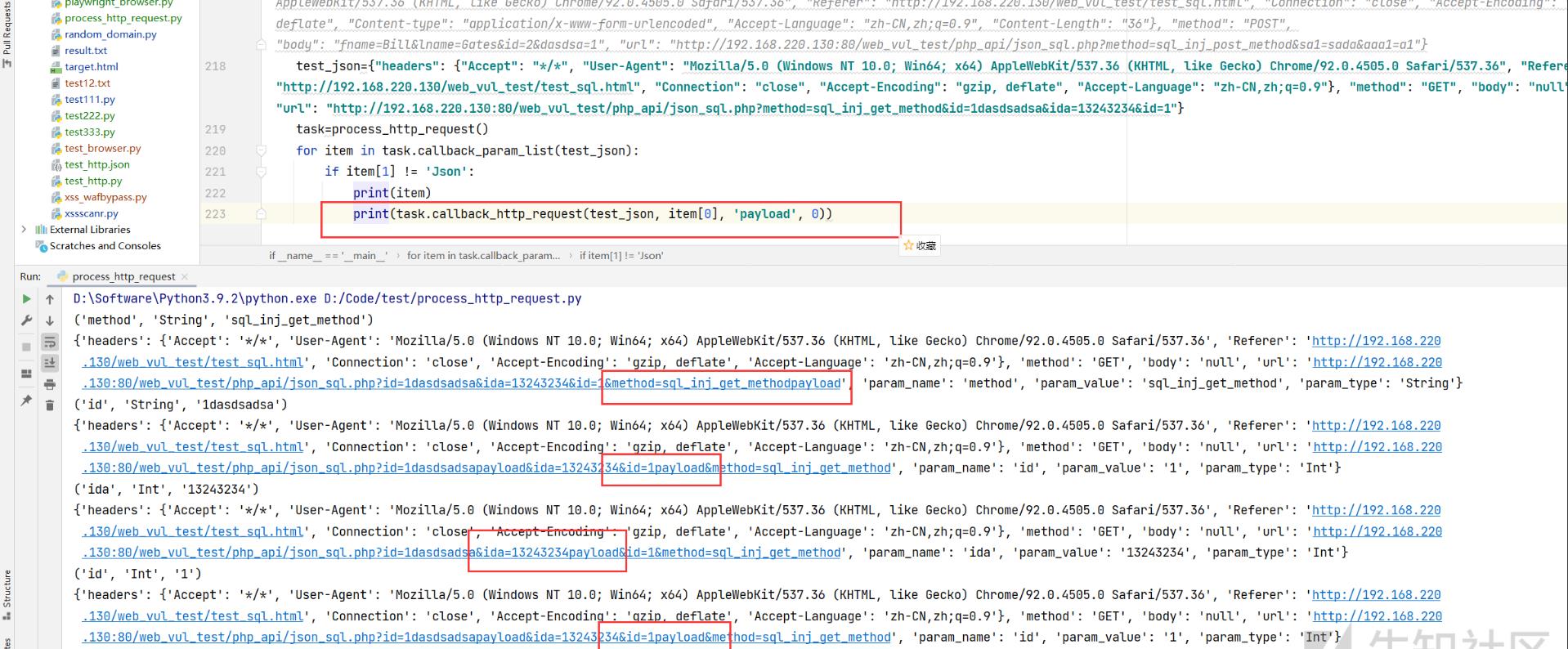学妹问我要工具渗透,我直接用Python做个工具甩给她,她又叫我晚上去她家修电脑?什么人啊!
Posted 大白Tang
tags:
篇首语:本文由小常识网(cha138.com)小编为大家整理,主要介绍了学妹问我要工具渗透,我直接用Python做个工具甩给她,她又叫我晚上去她家修电脑?什么人啊!相关的知识,希望对你有一定的参考价值。
自研黑客工具
1.自动黑盒漏洞检测思路
黑盒测试,也就是盲测http请求,进行漏洞挖掘,如检测挖掘XSS\\SQL\\SSRF\\命令执行\\代码执行 甚至于越权之类漏洞,此类漏洞都属于,代码/命令 拼接时不严谨出现的问题。
如挖sql注入,’" 如xss '">
2.功能分析
所需知识技能,Python php html javascript语言 Http协议之类,和一些常见漏洞的理解XSS\\SQL\\SSRF\\RCE之类。
如上所说,在黑盒挖掘漏洞时的操作规律为在参数值后面 “追加/替换/值前追加" payload等操作,如:
-
原URL http://192.168.220.130:80/web_vul_test/php_api/json_sql.php?id=111
-
http://192.168.220.130:80/web_vul_test/php_api/json_sql.php?as&fds=111payload 为追加
-
http://192.168.220.130:80/web_vul_test/php_api/json_sql.php?as&fds=payload 为替换
-
http://192.168.220.130:80/web_vul_test/php_api/json_sql.php?as&fds=payload111 值前追加
这三类操作就能覆盖大部分黑盒测试场景。
在HTTP请求时,大概有8种请求方式
1、OPTIONS
返回服务器针对特定资源所支持的HTTP请求方法,也可以利用向web服务器发送‘*’的请求来测试服务器的功能性
2、HEAD
向服务器索与GET请求相一致的响应,只不过响应体将不会被返回。这一方法可以再不必传输整个响应内容的情况下,就可以获取包含在响应小消息头中的元信息。
3、GET
向特定的资源发出请求。注意:GET方法不应当被用于产生“副作用”的操作中,例如在Web Application中,其中一个原因是GET可能会被网络蜘蛛等随意访问。Loadrunner中对应get请求函数:web_link和web_url
4、POST
向指定资源提交数据进行处理请求(例如提交表单或者上传文件)。数据被包含在请求体中。POST请求可能会导致新的资源的建立和/或已有资源的修改。
5、PUT
向指定资源位置上传其最新内容
6、DELETE
请求服务器删除Request-URL所标识的资源
7、TRACE
回显服务器收到的请求,主要用于测试或诊断
8、CONNECT
HTTP/1.1协议中预留给能够将连接改为管道方式的代理服务器。
最为常见的是GET/POST两种,为了节省代码量和篇幅,我也就介绍这两种方式的黑盒自动化测试。
3.代码实现
process_http_request.py
"""
@Time : 6/18/2021 17:02
@Author: guimaizi
@File: process_http_request.py
@Software: PyCharm
"""
import json,copy
from urllib.parse import urlparse
from urllib import parse
class process_http_request:
def __init__(self):
self.list_data=[]
def type_param(self,param_data):
'''
返回数据类型 INT Json List Url String
:param param_data:
:return:
'''
try:
int(param_data)
return 'Int'
except:pass
try:
if type(param_data) == type({'a': 1}):return 'Json'
except:pass
try:
if type(json.loads(param_data)) == type({'a': 1}):return 'Json'
except:pass
try:
if type(param_data) == type([]):return 'List'
except:pass
if parse.unquote(param_data).startswith('http://') or parse.unquote(param_data).startswith('https://'):return 'Url'
return 'String'
def process_payload(self,json_data, num, payload):
'''
Payload处理 0追加 1替换 2值前添加
:param json_data:
:param num:
:param payload:
:return:
'''
#print(num)
if num == 0:
json_data = str(json_data) + payload
elif num == 1:
json_data = payload
elif num == 2:
json_data = payload + str(json_data)
return json_data
def process_json(self,http_request_body, param_name=''):
'''
遍历json键名
:param http_request_body:
:param param_name:
:return:
'''
for name in http_request_body:
#print(name)
if param_name != '':
self.list_data.append((param_name + '.' + name,self.type_param(http_request_body[name]),http_request_body[name]))
else:
self.list_data.append((name,self.type_param(http_request_body[name]),http_request_body[name]))
if isinstance(http_request_body[name], dict):
if param_name != '':
self.process_json(http_request_body[name], param_name + '.' + name)
else:
self.process_json(http_request_body[name], name)
def callback_set_json(self,http_request,data):
http_request["param_name"] = data["param_name"]
http_request["param_value"] = data["param_value"]
http_request["param_type"] = data["param_type"]
return http_request
def callback_json_http_request(self,http_request_body, param_name_list, payload='', payload_num=0):
'''
Json格式http body返回
:param http_request_body:
:param param_name_list:json键名
:param payload:
:param num:
:return:
'''
param_name_list = param_name_list.split('.')
num_param = len(param_name_list)
num=0
task_name = 'http_request_body[param_name_list[%s]]' % num
for i in range(num_param):
if num ==num_param-1:
param_type = self.type_param(eval(task_name))
param_value=eval(task_name)
item=eval('task_name')+" = self.process_payload("+eval('task_name')+", payload_num, payload)"
exec(item)
num = num + 1
task_name =task_name+'[param_name_list[%s]]'%num
return {"param_name": '.'.join(param_name_list), "param_value": param_value, "param_type": param_type,
"data": http_request_body}
def callback_param_http_request(self, http_request_body, param, payload='', payload_num=0):
'''
a=str&b=str&c=1 返回
:param http_request_body:
:param param: 参数名
:param payload:
:param num:
:return:
'''
try:
list_data=[]
task_list=list(set(http_request_body.split('&')))
if '' in task_list:
task_list.remove('')
#print(task_list)
for tmp in task_list:
#print(tmp.split('=')[0])
#print(param)
tmp=copy.deepcopy(tmp)
if '=' in tmp and str(tmp.split('=')[0])==param:
param_name=tmp.split('=')[0]
param_value=tmp.split('=')[1]
param_type=self.type_param(tmp.split('=')[1])
list_data.append(tmp.split('=')[0]+'='+self.process_payload(tmp.split('=')[1],payload_num,payload))
else:
#print(tmp.split('='))
if len(tmp.split('='))==2:
list_data.append(tmp.split('=')[0] + '=' + tmp.split('=')[1])
else:
param_value='Null'
param_type='Null'
list_data.append(tmp.split('=')[0] + '=' + param_value)
#print(list_data)
return {"param_name":param_name, "param_value": param_value, "param_type": param_type,"param_data":'&'.join(list_data)}
except:return {}
def process_param(self, http_request_body, param_name=''):
'''
遍历参数名 a=str&b=str&c=1 这类参数处理
:param http_request:
:param param_name:
:return:
'''
try:
callback_param = []
for tmp in http_request_body.split('&'):
if len(tmp.split('='))==2:
callback_param.append((tmp.split('=')[0],self.type_param(tmp.split('=')[1]),tmp.split('=')[1]))
else:callback_param.append((tmp.split('=')[0],'Null','Null'))
return callback_param
except Exception as e:
print(e)
return []
def callback_param_list(self,http_request):
'''
:param http_request:
:return: (参数名 , 参数值类型)
[('method', 'String'), ('name', 'String'), ('age', 'Int'), ('data', 'Json'), ('data.name', 'String'), ('sada', 'Int')]
'''
param_list=[]
query = parse.urlparse(http_request['url']).query
if http_request['method'] == 'GET' and query!='':
param_list.extend(self.process_param(query))
elif http_request['method'] == 'POST' and http_request['body']!='':
if query!='':param_list.extend(self.process_param(query))
if self.type_param(http_request['body'])=='Json':
if type(http_request['body'])==type({}):
self.process_json(http_request['body'])
else:
self.process_json(json.loads(http_request['body']))
param_list.extend(self.list_data)
else:
param_list.extend(self.process_param(http_request['body']))
self.list_data=[]
return param_list
def callback_http_request(self,http_request,param,payload='',payload_num=0):
'''
返回设置payload后的http请求包
:param http_request:
:param param:
:param payload:
:param payload_num:
:return:
'''
http_request=copy.deepcopy(http_request)
if self.type_param(http_request['body'])=='Json':
http_request['body']=json.loads(http_request['body'])
url_process = parse.urlparse(http_request['url'])
http_get_data = self.callback_param_http_request(copy.deepcopy(url_process.query), param, payload, payload_num)
if http_request['method'] == 'GET' and url_process.query!='' and http_get_data!= {}:
http_request['url'] = url_process.scheme + '://' + url_process.netloc + url_process.path + '?' + http_get_data[
'param_data']
http_request=self.callback_set_json(http_request,http_get_data)
return http_request
elif http_request['method'] == 'POST' and http_request['body'] != 'Null':
if url_process.query != '' and http_get_data!= {}:
http_request['url']=url_process.scheme+'://'+url_process.netloc+url_process.path+'?'+http_get_data['param_data']
http_request=self.callback_set_json(http_request,http_get_data)
return http_request
if self.type_param(http_request['body'] )=='Json':
json_data=self.callback_json_http_request(http_request['body'],param,payload,payload_num)
http_request = self.callback_set_json(http_request, json_data)
http_request["body"] = json_data["data"]
return http_request
elif http_request['body']!='Null' :
post_data = self.callback_param_http_request(copy.deepcopy(http_request["body"]), param, payload,payload_num)
if post_data!={}:
http_request = self.callback_set_json(http_request, post_data)
http_request["body"] = post_data["param_data"]
return http_request
return http_request
if __name__ == '__main__':
test_json={"headers": {"Origin": "http://192.168.220.130", "Cookie": "PHPSESSID=1db5thrprbsm1nms5fer3fdj7c", "Accept": "*/*", "User-Agent": "Mozilla/5.0 (Windows NT 10.0; Win64; x64) AppleWebKit/537.36 (KHTML, like Gecko) Chrome/92.0.4505.0 Safari/537.36", "Referer": "http://192.168.220.130/web_vul_test/test_sql.html", "Connection": "close", "Accept-Encoding": "gzip, deflate", "Content-type": "application/json", "Accept-Language": "zh-CN,zh;q=0.9", "Content-Length": "58"}, "method": "POST", "body": "{\\"name\\":\\"lisi\\",\\"age\\":50,\\"data\\":{\\"name\\":\\"acccca\\"},\\"sada\\":1}", "url": "http://192.168.220.130:80/web_vul_test/php_api/json_sql.php?method=sql_inj_json_insert_method&dsadas=aa1111111"}
#test_json = {"headers": {"Cookie": "PHPSESSID=1db5thrprbsm1nms5fer3fdj7c", "Accept": "*/*", "User-Agent": "Mozilla/5.0 (Windows NT 10.0; Win64; x64) AppleWebKit/537.36 (KHTML, like Gecko) Chrome/92.0.4505.0 Safari/537.36", "Referer": "http://192.168.220.130/web_vul_test/test_sql.html", "Connection": "close", "Accept-Encoding": "gzip, deflate", "Accept-Language": "zh-CN,zh;q=0.9"}, "method": "GET", "body": "null", "url": "http://192.168.220.130:80/web_vul_test/php_api/json_sql.php?as&fds=111"}
#test_json={"headers": {"Origin": "http://192.168.220.130", "Cookie": "PHPSESSID=1db5thrprbsm1nms5fer3fdj7c", "Accept": "*/*", "User-Agent": "Mozilla/5.0 (Windows NT 10.0; Win64; x64) AppleWebKit/537.36 (KHTML, like Gecko) Chrome/92.0.4505.0 Safari/537.36", "Referer": "http://192.168.220.130/web_vul_test/test_sql.html", "Connection": "close", "Accept-Encoding": "gzip, deflate", "Content-type": "application/x-www-form-urlencoded", "Accept-Language": "zh-CN,zh;q=0.9", "Content-Length": "36"}, "method": "POST", "body": "fname=Bill&lname=Gates&id=2&dasdsa=1", "url": "http://192.168.220.130:80/web_vul_test/php_api/json_sql.php?method=sql_inj_post_method&sa1=sada&aaa1=a1"}
task=process_http_request()
for item in task.callback_param_list(test_json):
if item[1] != 'Json':
print(item)
print(task.callback_http_request(test_json, item[0], 'payload', 0))
加V:mashibin98,领取价值11980安全资料包
以上为要用到的代码
案例解释1:
用burp抓包得到的GET请求:
GET /web_vul_test/php_api/json_sql.php?method=sql_inj_get_method&id=1dasdsadsa&ida=13243234&id=1 HTTP/1.1
Host: 192.168.220.130
User-Agent: Mozilla/5.0 (Windows NT 10.0; Win64; x64) AppleWebKit/537.36 (KHTML, like Gecko) Chrome/92.0.4505.0 Safari/537.36
Accept: */*
Referer: http://192.168.220.130/web_vul_test/test_sql.html
Accept-Encoding: gzip, deflate
Accept-Language: zh-CN,zh;q=0.9
Connection: close
加V:mashibin97,领取价值11980安全资料包
通过我的burp插件(这个之后写)处理后为:
{
"headers":
{
"Accept": "*/*",
"User-Agent": "Mozilla/5.0 (Windows NT 10.0; Win64; x64) AppleWebKit/537.36 (KHTML,like Gecko) Chrome/92.0.4505.0 Safari/537.36",
"Referer": "http://192.168.220.130/web_vul_test/test_sql.html",
"Connection": "close",
"Accept-Encoding": "gzip,deflate",
"Accept-Language": "zh-CN,zh;q=0.9"
},
"method": "GET",
"body": "null",
"url": "http://192.168.220.130:80/web_vul_test/php_api/json_sql.php?method=sql_inj_get_method&id=1dasdsadsa&ida=13243234&id=1"
}
加V:mashibin98,领取价值11980安全资料包
这个时候从漏洞检测的角度讲,我完全可以通过修改User-Agent/Referer/Cookie,之类的header参数值,进行些黑盒漏洞测试,当然我们要讲的不在这里,是在URL:http://192.168.220.130:80/web_vul_test/php_api/json_sql.php?method=sql_inj_get_method&id=1dasdsadsa&ida=13243234&id=1 的参数段,
method=sql_inj_get_method&id=1dasdsadsa&ida=13243234&id=1,web漏洞不考虑0/N-day的情况下,大部分漏洞都在这个地方, 我们以上的代码process_http_request.py也就是为了处理这个地方。

如图所示,结果为
method=sql_inj_get_method&id=1dasdsadsa&ida=13243234&id=1
(参数名,参数值类型,参数值)
('method', 'String', 'sql_inj_get_method')
('id', 'String', '1dasdsadsa')
('ida', 'Int', '13243234')
('id', 'Int', '1')
加V:mashibin98,领取价值11980安全资料包
('method', 'String', 'sql_inj_get_method')
{'headers': {'Accept': '*/*', 'User-Agent': 'Mozilla/5.0 (Windows NT 10.0; Win64; x64) AppleWebKit/537.36 (KHTML, like Gecko) Chrome/92.0.4505.0 Safari/537.36', 'Referer': 'http://192.168.220.130/web_vul_test/test_sql.html', 'Connection': 'close', 'Accept-Encoding': 'gzip, deflate', 'Accept-Language': 'zh-CN,zh;q=0.9'}, 'method': 'GET', 'body': 'null', 'url': 'http://192.168.220.130:80/web_vul_test/php_api/json_sql.php?id=1dasdsadsa&ida=13243234&id=1&method=sql_inj_get_methodpayload', 'param_name': 'method', 'param_value': 'sql_inj_get_method', 'param_type': 'String'}
('id', 'String', '1dasdsadsa')
{'headers': {'Accept': '*/*', 'User-Agent': 'Mozilla/5.0 (Windows NT 10.0; Win64; x64) AppleWebKit/537.36 (KHTML, like Gecko) Chrome/92.0.4505.0 Safari/537.36', 'Referer': 'http://192.168.220.130/web_vul_test/test_sql.html', 'Connection': 'close', 'Accept-Encoding': 'gzip, deflate', 'Accept-Language': 'zh-CN,zh;q=0.9'}, 'method': 'GET', 'body': 'null', 'url': 'http://192.168.220.130:80/web_vul_test/php_api/json_sql.php?id=1dasdsadsapayload&ida=13243234&id=1payload&method=sql_inj_get_method', 'param_name': 'id', 'param_value': '1', 'param_type': 'Int'}
('ida', 'Int', '13243234')
{'headers': {'Accept': '*/*', 'User-Agent': 'Mozilla/5.0 (Windows NT 10.0; Win64; x64) AppleWebKit/537.36 (KHTML, like Gecko) Chrome/92.0.4505.0 Safari/537.36', 'Referer': 'http://192.168.220.130/web_vul_test/test_sql.html', 'Connection': 'close', 'Accept-Encoding': 'gzip, deflate', 'Accept-Language': 'zh-CN,zh;q=0.9'}, 'method': 'GET', 'body': 'null', 'url': 'http://192.168.220.130:80/web_vul_test/php_api/json_sql.php?id=1dasdsadsa&ida=13243234payload&id=1&method=sql_inj_get_method', 'param_name': 'ida', 'param_value': '13243234', 'param_type': 'Int'}
('id', 'Int', '1')
{'headers': {'Accept': '*/*', 'User-Agent': 'Mozilla/5.0 (Windows NT 10.0; Win64; x64) AppleWebKit/537.36 (KHTML, like Gecko) Chrome/92.0.4505.0 Safari/537.36', 'Referer': 'http://192.168.220.130/web_vul_test/test_sql.html', 'Connection': 'close', 'Accept-Encoding': 'gzip, deflate', 'Accept-Language': 'zh-CN,zh;q=0.9'}, 'method': 'GET', 'body': 'null', 'url': 'http://192.168.220.130:80/web_vul_test/php_api/json_sql.php?id=1dasdsadsapayload&ida=13243234&id=1payload&method=sql_inj_get_method', 'param_name': 'id', 'param_value': '1', 'param_type': 'Int'}
加V:mashibin98,领取价值11980安全资料包
请自行发现规律和理解下…
该代码主要用这两个方法:
callback_param_list 方法为,遍历http的请求参数 并遍历返回 (参数名,参数值类型,参数值)
callback_http_request 方法为:
callback_http_request(burp转好的http request,要设置的参数名,payload,payload_num)
payload_num 0为值后追加 1为替换 2为值前追加
然后返回设置好payload的http request。
案例解释2:
POST方式 JSON数据格式传参的http请求
{
"headers":
{
"Origin": "http://192.168.220.130",
"Accept": "*/*",
"User-Agent": "Mozilla/5.0 (Windows NT 10.0; Win64; x64) AppleWebKit/537.36 (KHTML,
like Gecko) Chrome/92.0.4505.0 Safari/537.36",
"Referer": "http://192.168.220.130/web_vul_test/test_sql.html",
"Connection": "close",
"Accept-Encoding": "gzip,deflate",
"Content-type": "application/json",
"Accept-Language": "zh-CN,zh;q=0.9",
"Content-Length": "58"
},
"method": "POST",
"body": "
{
\\"name\\":\\"lisi\\",
\\"age\\":50,
\\"data\\":
{
\\"name\\":\\"acccca\\",
\\"data\\":
{
\\"url\\":\\"http://www.qq.com\\"
}
},
\\"sada\\":1
}
",
"url": "http://192.168.220.130:80/web_vul_test/php_api/json_sql.php?method=sql_inj_json_insert_method"
}
加V:mashibin98,领取价值11980安全资料包

其实了和案例1 没有什么区别,就是GET和POST参数处理,支持处理 GET POST, a=1&b=c&asda=dsadsa 和JSON方式传参,并且遍历json N层json嵌套都可以。
漏洞检测案例
案例1 ssrf检测
关于案例而的实战应用,假设url参数名是一个ssrf漏洞, 实际黑盒漏洞挖掘中,我们需要手工换掉http://www.qq.com为http://www.ssrf.com
{'headers': {'Origin': 'http://192.168.220.130', 'Accept': '*/*', 'User-Agent': 'Mozilla/5.0 (Windows NT 10.0; Win64; x64) AppleWebKit/537.36 (KHTML, like Gecko) Chrome/92.0.4505.0 Safari/537.36', 'Referer': 'http://192.168.220.130/web_vul_test/test_sql.html', 'Connection': 'close', 'Accept-Encoding': 'gzip, deflate', 'Content-type': 'application/json', 'Accept-Language': 'zh-CN,zh;q=0.9', 'Content-Length': '58'}, 'method': 'POST', 'body': {'name': 'lisi', 'age': 50, 'data': {'name': 'acccca', 'data': {'url': 'http://www.ssrf.com'}}, 'sada': 1}, 'url': 'http://192.168.220.130:80/web_vul_test/php_api/json_sql.php?method=sql_inj_json_insert_method', 'param_name': 'data.data.url', 'param_value': 'http://www.qq.com', 'param_type': 'Url'}
然后我们二次重放这个http request,就是在进行SSRF漏洞检测了。
案例2 反射XSS检测
反射XSS的检测原理为判断响应包。
-
1,是否为http响应为可浏览器解析渲染的页面 如Response的Content-Type: 是html/xml之类,
-
2, http响应内容里是否存在有 请求包URL上可控的参数。
-
3,该可控参数是否可以执行
JavaScript
{
"headers":
{
"Accept": "*/*",
"User-Agent": "Mozilla/5.0 (Windows NT 10.0; Win64; x64) AppleWebKit/537.36 (KHTML,
like Gecko) Chrome/92.0.4505.0 Safari/537.36",
"Referer": "http://192.168.220.130/web_vul_test/test_sql.html",
"Connection": "close",
"Accept-Encoding": "gzip,
deflate",
"Accept-Language": "zh-CN,
zh;q=0.9"
},
"method": "GET",
"body": "null",
"url": "http://192.168.220.130:80/web_vul_test/php_api/json_sql.php?method=sql_inj_get_method&id=1dasdsadsa&ida=13243234&xss=xsss"
}
加V:mashibin98,领取价值11980安全资料包
假设如上请求包,URL上参数名为xss的符合 以上三个反射XSS的条件,是个反射型XSS漏洞,我们通过process_http_request.py来进行操作,

如图遍历所有参数 追加payload,并再重放http请求,就能检测到xss名是存在XSS漏洞的。
结语
这篇就是很单纯的http请求包处理,属于漏洞检测的核心功能,配合burp/爬虫之类,用于自动化漏扫和被动式漏扫,方便自动化设置payload,web漏洞测试工具研发是很麻烦的,首先第一步得搞一个靶场,各种奇葩的靶场环境.
并且有很多http,html,JavaScript,css, php, nodejs, jsp之类奇奇怪怪的web场景案例,http协议上的各种奇怪问题,比如GraphQL方式传参, 以及响应包里的奇怪问题,甚至于为了覆盖检测某些奇葩业务还要考虑vbscript的靶场案例来满足扫描器的需求,还有响应内容的问题… 。
以上是关于学妹问我要工具渗透,我直接用Python做个工具甩给她,她又叫我晚上去她家修电脑?什么人啊!的主要内容,如果未能解决你的问题,请参考以下文章
学妹问我要工具渗透,我直接用Python做个工具甩给她,她又叫我晚上去她家修电脑?什么人啊!



